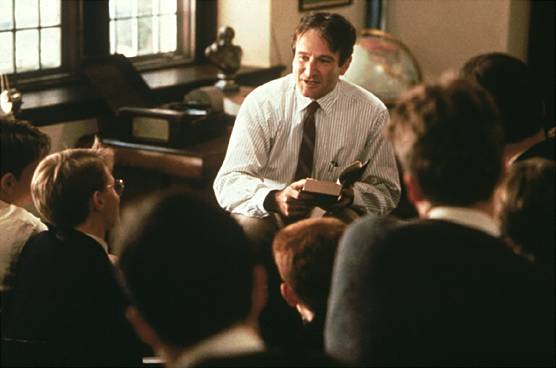
Robin Williams in Dead Poets Society
I seem to be returning to my childhood in recent posts, what with all my references to Sewanee, Tennessee. In my last entry I showed literary scholar Robert Scholes blaming Allen Tate, a poet and critic with close ties to Sewanee, for the abysmal state of American literature instruction. To balance Tate out, my launching point today is a Sewanee alum who has provided an alternative way of teaching poetry.
I have in mind Sam Pickering. If you haven’t heard the name, perhaps you’ve seen Peter Weir’s Dead Poets Society, a story about an English teacher at a New England prep school and the boys he inspires. Robert Schulman based his Oscar-winning original screenplay on one of his own high school teachers, and that teacher was Pickering. How accurate the depiction is I do not know so I’ll shift here to the fictional character.
Keating’s vision is that literature is meant to change lives. The enemy of poetry, as he sees it, is English teachers who turn the study of poetry into a science. Their textbook is Understanding Poetry by one J. Evans Pritchard, who graphs poetry on a chart: the x axis is for style, the y axis is for substance, and the overall mass determines the greatness of the poem. (Thus Byron, who scores high on the x but low on the y, is a lesser poet than Shakespeare, who scores high on both.) Keating has the students tear Pritchard’s introduction out of their textbooks: “Keep ripping gentlemen. This is a battle, a war. And the casualties could be your hearts and souls.”
“Why do poets write poetry”” he asks his students at one point and then tells them it is “to woo women.” He introduces them to Robert Herrick’s carpe diem lyric “To the Virgins, to Make the Most of Time” (that’s the “Gather ye rosebuds while ye may” poem) and tells them they must seize the day. He has them recite heroic verses as they perform exercises on the athletic field. They are to refer to him as “Oh captain, my captain,” after the Whitman poem about the death of Lincoln. At one point he tells them to practice walking to the beat of a different drummer (Thoreau), differing their strides from the people around them. And he takes one of his shyest students, has him stand on his desk, and deliver Whitman’s “barbaric yawp” (from the final stanza of “Song of Myself”).
Keating thrills the students with passages from Shakespeare. (Robin Williams doing a John Wayne Macbeth and a Marlon Brando Mark Antony are among the film’s high points.) But his greatest gift is planting in them the idea of the Dead Poets Society, a secret group where a few students go out at night and read poetry. The society is guided by Thoreau’s famous passage from Walden (inaccurately quoted in the movie), “I went to the woods because I wished to live deliberately, to front only the essential facts of life, and see if I could not learn what it had to teach, and not, when I came to die, to discover that I had not lived.”
The boys become caught up in the society. They find a secret hollow and read love poetry by Abraham Cowley (accompanied by a Playboy centerfold) and inspirational poetry, including Tennyson’s “Ulysses.” They bring girls and enchant them with lines from Shakespeare (“Shall I compare thee to a summer’s day”) and Byron (“She walks in beauty like the night/Of cloudless climes and starry skies”). They go dancing through the night chanting lines from Vachel Lindsay’s (racist) poem “Congo”:
THEN I had religion, THEN I had a vision.
I could not turn from their revel in derision.
THEN I SAW THE CONGO, CREEPING THROUGH THE BLACK,
CUTTING THROUGH THE JUNGLE WITH A GOLDEN TRACK.
But if poetry is so powerful, it’s not enough to read it. The students conclude that they must also draw upon it to change their lives.
And so they do. One student seizes the day and asks a girl on a date, even though it means standing up to her jock boyfriend. Another bucks his authoritarian father, auditioning for and getting the part of Puck in Midsummer Night’s Dream. A third, when all has gone horribly wrong, overcomes his pathological shyness and makes a public stand for a man who is being unjustly treated, even though it takes everything that he has.
I enjoy the film and am grateful to it for how it shows poetry’s ability to shape lives. But I don’t think the film goes far enough. As I see it, Dead Poets Society actually underestimates poetry’s power, and that for some interesting reasons. It believes poetry can inspire people to perform acts of courage and defiance but not that it can prevent them from committing suicide.
If poetry comes up short, I don’t believe it is poetry’s fault. Rather, I would argue, the fault lies within Keating’s teaching, which counters the scientism of J. Evans Pritchard by celebrating a sensual and thoughtless immersion in poetry. This immersion is vital and wonderful and without it poetry truly is dead. But more can be done with poetry. Neil, I think, fails to grasp an important insight to be found in the very play in which he is performing. In tomorrow’s post I will discuss how engaging him in a thoughtful discussion of Midsummer Night’s Dream might have forestalled his suicide.


One Trackback
[…] Dead Poets Society preaches. (I wrote a series of posts on that films last year, beginning with this one.) But as so often occurs, our society just went to the other extreme. When I was a boy, I […]